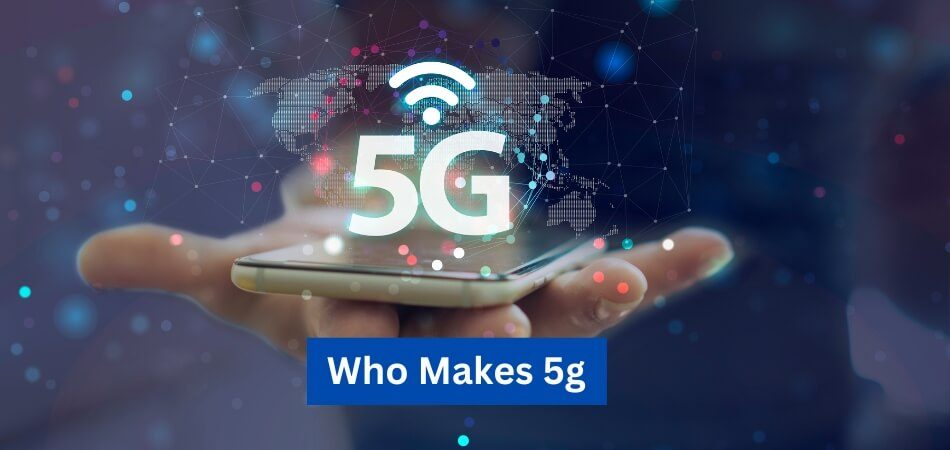The 5G network is the latest and greatest in mobile technology, but who is responsible for making it possible? We’re here to answer this question, detailing who the key players are in the development of 5G and how they have worked together to bring this revolutionary technology to life. From the leading telecommunications companies to the innovative hardware and software developers, we’ll take a look at the individuals and organizations that have been instrumental in bringing 5G to the world.
Who Makes 5g?
5G technology is being developed by many big tech companies around the world. Some of the companies leading the way in 5G development include Qualcomm, Huawei, Nokia, Ericsson, Samsung, Intel, and Apple. Qualcomm is one of the first companies to develop 5G technology, and they are currently working on the Snapdragon X55 5G Modem-RF System. Huawei is another leading provider of 5G technology and is currently working on its 5G Balong 5000 chipset. Nokia is also developing 5G technology, and their 5G product portfolio includes their 5G AirScale portfolio of base stations and radio access products. Ericsson is also working on 5G technology and their 5G portfolio includes their 5G Radio System and 5G Core Network products. Samsung is also developing 5G technology, and their 5G portfolio includes their 5G Radio Access Network and Core Network products. Intel is also working on 5G technology, and their 5G portfolio includes their 5G Modem and 5G Network Platform products. Apple is also working on 5G technology, and their 5G portfolio includes their 5G Modem and 5G Network Platform products.
Leading 5G Companies
There are several companies that are currently leading the way in 5G development and deployment. These include:
- Qualcomm: Qualcomm is a major global supplier of 5G chipsets, and has been instrumental in the development of 5G technology.
- Huawei: Huawei is a Chinese telecoms giant and one of the world’s leading 5G providers.
- Ericsson: Ericsson is a Swedish telecoms company that is a major player in 5G technology.
- Nokia: Nokia is a Finnish telecoms company that is also a major player in 5G technology.
- Intel: Intel is an American tech giant that is involved in the development and production of 5G chipsets.
- Samsung: Samsung is a South Korean tech giant that is also involved in the development and production of 5G chipsets.
- Apple: Apple is an American tech giant that is expected to enter the 5G market in the near future.
Other Companies Involved in 5G
In addition to the companies mentioned above, there are many other companies involved in the development and deployment of 5G. These include telecoms companies such as AT&T, Verizon, T-Mobile, and Sprint, as well as chipmakers such as MediaTek, Spreadtrum, and Marvell. There are also many smaller companies involved in the 5G ecosystem, such as TowerJazz, Cavium, and Telit.
Top 6 Frequently Asked Questions
What is 5G?
5G is the fifth generation of wireless technology, which is based on the latest network standard that supports much faster data speeds than the 4G LTE technology that preceded it. 5G is designed to be significantly faster and more reliable than earlier mobile networks, allowing for faster downloads, smoother streaming, and more reliable connections. It should also be capable of carrying much more data, which means that 5G could eventually be used to power other applications, such as autonomous vehicles, virtual reality, and the Internet of Things.
Who Makes 5G?
5G technology is developed and produced by a variety of different companies. The main players in the 5G market are telecommunications companies such as AT&T, Verizon, T-Mobile, and Sprint, as well as tech companies like Nokia, Ericsson, Qualcomm, and Intel. These companies all have a hand in developing the technology, manufacturing the hardware, and providing the necessary infrastructure for 5G networks.
What are the Benefits of 5G?
5G offers a number of benefits over existing wireless technologies. It has the potential to provide faster download and upload speeds, lower latency, and improved reliability. Additionally, it can provide more capacity, allowing for more users to be connected to a network at once. 5G can also enable new applications, such as autonomous vehicles, virtual reality, and the Internet of Things.
How Does 5G Work?
5G technology is based on a new network standard that uses different radio frequencies than earlier generations of wireless technology. The new standard uses higher frequency bands, which allow for faster data speeds and more capacity. Additionally, 5G networks use multiple antennas, allowing for better signal coverage and improved reliability.
What Countries Have 5G?
5G networks are currently available in many countries around the world, including the United States, United Kingdom, China, Japan, South Korea, and Canada. Other countries, such as Germany, France, Australia, and India, are also in the process of rolling out 5G networks.
What Devices Work with 5G?
In order to access 5G networks, you need to have a device that is compatible with the new network standard. Most of the major smartphone manufacturers, including Apple, Samsung, Google, and LG, now offer 5G-compatible devices. Additionally, many routers and other devices, such as laptops, tablets, and wearables, can now connect to 5G networks.
In conclusion, 5G technology is a powerful tool that has the potential to revolutionize the way we access the internet and communicate with each other. It is expected to provide faster internet speeds, higher connection quality, and more reliable and secure connections. The answer to the question of “Who makes 5G?” is that it is a complex collaboration between multiple players, including telecommunications providers, equipment manufacturers, and technology companies. By working together and leveraging their respective strengths, these entities are able to bring 5G to life and make it available to consumers around the world.
